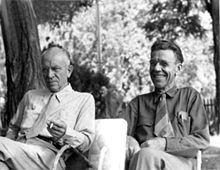Aldo Leopold
| Aldo Leopold | |
|---|---|

Leopold (left) in 1946
|
|
| Born |
January 11, 1887 Burlington, Iowa |
| Died | April 21, 1948 (aged 61) Baraboo, Wisconsin |
| Occupation | Author, ecologist, forester, and nature writer |
| Nationality | American |
| Subject | Conservation, land ethic, land health, ecological conscience |
| Notable works | A Sand County Almanac |
| Spouse | Estella Leopold |
| Children | A. Starker Leopold, Luna B. Leopold, Nina Leopold Bradley, A. Carl Leopold, Estella Leopold |
Aldo Leopold (January 11, 1887 – April 21, 1948) was an American author, philosopher, scientist, ecologist, forester, conservationist, and environmentalist. He was a professor at the University of Wisconsin and is best known for his book A Sand County Almanac (1949), which has sold more than two million copies.
Leopold was influential in the development of modern environmental ethics and in the movement for wilderness conservation. His ethics of nature and wildlife preservation had a profound impact on the environmental movement, with his ecocentric or holistic ethics regarding land. He emphasized biodiversity and ecology and was a founder of the science of wildlife management.
Rand Aldo Leopold was born in Burlington, Iowa, on January 11, 1887. His father, Carl Leopold, was a businessman who made walnut desks; and his mother, born Clara Starker, was Carl's first cousin. Charles Starker, father of Clara and uncle of Carl, was a German immigrant, educated in engineering and architecture. Rand Aldo was named after two of Carl's business partners—C. W. Rand and Aldo Sommers—although the "Rand" was eventually dropped. The Leopold family included younger siblings Mary Luize, Carl Starker, and Frederic. Leopold's first language was German, although he mastered English at an early age.
Aldo Leopold's early life was highlighted by the outdoors. Carl would take his children on excursions into the woods and taught his oldest son woodcraft and hunting. Aldo showed an aptitude for observation, spending hours counting and cataloging birds near his home. Mary would later say of her older brother, "He was very much an outdoorsman, even in his extreme youth. He was always out climbing around the bluffs, or going down to the river, or going across the river into the woods." He attended Prospect Hill Elementary, where he ranked at the top of his class, and then, the overcrowded Burlington High School. Every August, the family vacationed in Michigan at the forested Les Cheneaux Islands in Lake Huron, which the children took to exploring.
In 1900, Gifford Pinchot, who oversaw the newly implemented Division of Forestry in the Department of Agriculture, donated money to Yale University to begin one of the nation's first forestry schools. Hearing of this development, the teenage Leopold decided on forestry as a vocation. His parents agreed to let him attend The Lawrenceville School, a preparatory college in New Jersey in order to improve his chances of admission to Yale. The Burlington High School principal wrote in a reference letter to the headmaster at Lawrenceville that Leopold was "as earnest a boy as we have in school... painstaking in his work.... Moral character above reproach." He arrived at his new school in January 1904, shortly before he turned seventeen. He was considered an attentive student, although he was again drawn to the outdoors. Lawrenceville was suitably rural, and Leopold spent much time mapping the area and studying its wildlife. Leopold studied at the Lawrenceville School for a year, during which time he was accepted to Yale University. Because the Yale School of Forestry granted only graduate degrees, he first enrolled in Sheffield Scientific School's preparatory forestry courses for his undergraduate studies. While Leopold was able to explore the woods and fields of Lawrenceville daily, sometimes to the detriment of his studying, in Yale he had little opportunity to do so; his studies and social life engagements made his outdoor trips few and far between.
...
Wikipedia
